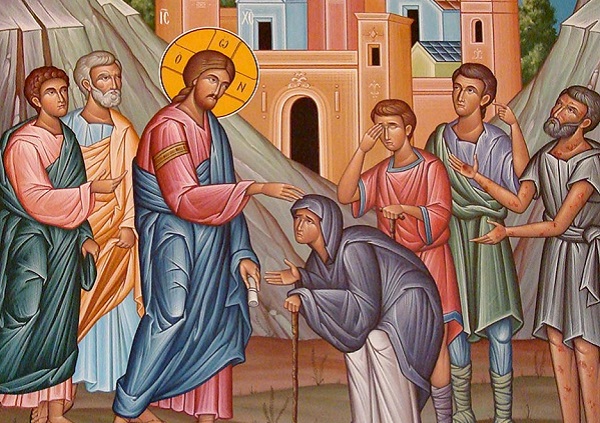
Oct. 24, 2022 – Luke 13:10-17
Today we have an example of people so busy criticizing what others are doing that they are totally unaware of the emptiness in their own lives.
Jesus is in the synagogue teaching on the Sabbath day. There is also a woman there; she is bent and a spirit prevents her from standing up straight. The infirmity is not only physical: it keeps her constrained in a posture that prevents her from looking up; she is bent toward the ground and is focused all on herself. She seems to be impassive, accustomed by now to being like this; she has no name, she is still. Jesus in the midst of the crowd sees her and calls her to himself.
The healing of the bent woman is symbolic of those who, bent and oppressed, are lifted up and launched into a new life. And this is the miracle performed by the Word, Bread of Life, which we feed on every day if we are able to hear it and put it into practice. It is the Word that guides us
guides us and shows us the way forward, every day, even and especially on feast days. The miracle takes place, in fact, on the Sabbath day, used by Jesus to give tangible evidence of healing. As always, the chief priests are eager to catch Jesus in the act and begin to debate whether or not it is permissible to heal on the Sabbath day. The people of Israel observed the Sabbath by abstaining from all work so that all could bless the goodness of God who had delivered Israel from oppression. In other healings it was people in need who turned to Jesus for help, here on the Sabbath day it is Jesus who takes the initiative, “Jesus saw her, he called her to himself….” When our back is bent, we look down and cannot notice the beauties God has in store for us, the way forward, the people beside us. This is when we are when we are bent over morally and, therefore, oppressed by human and sometimes even ecclesiastical power, bent over by an inner malaise, crushed by the burdens of life and the humiliations, the marginalizations of a society enslaved by man.
What is surprising in this account is that Jesus takes the initiative and performs an action that, in addition to freeing the sick woman, serves to teach people how one can free oneself from what are the conditioning or obstacles that prevent spiritual growth. Jesus always intervenes to give help; he is the one who takes the initiative so that those realities that seem dead or that seem, as in Zacchaeus, to be a hopeless case are actually solvable and, through him, become the means of becoming “children of Abraham” again.
Oppression is something that takes one’s breath away; Jesus says “I will restore you,” which means “I will restore your breath so that you can return to living fully and resume walking in the way of the Lord.”
Fr Joby Kavungal RCJ
San Lorenzo Parish, TREZZANO SUL NAVIGLIO – MILAN

